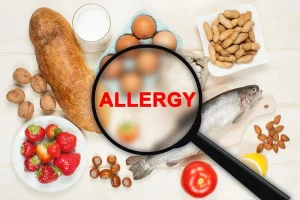Nut allergies affect millions of people worldwide and are one of the most common and serious food allergies. People with nut allergies can develop dangerous allergic reactions to even small amounts of nuts. Reactions can range from mild symptoms to allergic reactions or even life-threatening. If you or someone you care about is determined to have a nut allergy, you should stay away from nuts to protect your health and safety. To live a safe and healthy life with nut allergies, you need to know how to avoid nuts, how to deal with allergic reactions, and how to stay informed. This detailed guide will help you find ways to deal with nut allergies and stay safe.
Learn More About the Different Types of Nut Allergies:
Nut allergies can be divided into two broad categories: peanut allergies and tree nut allergies. Almonds, walnuts, cashews, hazelnuts, pecans, and pistachios are all nuts. Peanuts, on the other hand, are a vegetable, but can cause nutty allergic reactions. It is important to remember that just because you are allergic to peanuts does not mean you are allergic to tree nuts, although it is common for people to be allergic to both types of nuts. If you or someone you care about has a nut allergy, you should know what types of nuts they are and be very careful not to use them in foods and other things.
Read Food Labels Carefully:
Read food labels carefully before eating prepared foods. This is one of the most important things you can do to prevent nut allergies. The law requires food manufacturers to list allergens like peanuts and tree nuts on their labels. Look for words like “May contain traces of nuts” or “Contains peanuts,” which means that nuts may have been used in the manufacturing process. Be wary of foods with unclear labels, and if you are unsure, it is best to stay away from the product altogether. The potential for cross-contamination is greater when nuts are hidden in prepared foods, snacks, and baked goods, or are produced in facilities where nuts are also processed.
Consider cross-Contamination:
Cross-contamination is a major concern when it comes to nut allergies. This occurs when nut-free foods come into contact with nuts during preparation, handling, or preparation. Food can become contaminated with nuts when tools, cutting boards, and cooking surfaces are shared, such as in bakeries, restaurants, and even at home. To prevent this, inform restaurant staff, food handlers, or anyone else who prepares food of your allergy and ask them to take steps to prevent cross-contact. To reduce the risk of cross-contamination in your home, you may want to use different cookware and dishes for nut-free cooking.
Choose Nut-Free Foods:
Many popular foods and snacks contain nuts or ingredients made from nuts, but there are also many options that are nut-free. For example, if you love nut butters, you might choose sunflower seed butter or soy butter. These taste and feel similar, but don’t pose a risk for nut allergies. You can use seeds like pumpkin or chia in place of nuts when baking or cooking. These seeds are healthy and safe for people with nut allergies. If you can find nut-free versions of your favorite foods, you can enjoy a wide variety of foods without worrying about your health or safety.
Plan Ahead When Eating Out:
Eating out with a nut allergy can be tricky, but if you plan ahead, it’s possible. Before you go to a restaurant, check their online menu or give them a call to see if they can accommodate people with nut allergies. Many places have allergen-free menus or can modify dishes to make them nut-free. When you get there, make your allergies clear to the staff and ask specific questions about the ingredients in the food and how it’s prepared. Some salads, desserts, and sauces are more likely to contain nuts than others. If you have a history of severe reactions, you should carry an epinephrine auto-injector.
Be Prepared for Allergic Reactions:
Even if you do your best to stay away from nuts, you can still accidentally ingest them. You should always be prepared for an allergic reaction, especially if you are severely allergic to nuts. Carry an epinephrine auto-injector, such as an EpiPen, because it can save your life if someone has an allergic reaction. Make sure that people around you, such as family, friends, and coworkers, know how to use the auto-injector and what to do if you have an allergic reaction. Early symptoms can include a rash, itching, swelling, or difficulty breathing. If you act quickly, you can prevent the reaction from getting worse. In addition to your medications, you may want to wear a medical alert bracelet or carry an allergy card that tells people about your allergies and what to do in an emergency.
Learn About Nut Allergies in Yourself and Others:
Getting educated is the best way to address and prevent nut problems. Make sure you understand the different types of nuts, how to avoid coming into contact with them in your daily life, and what the signs of an allergic reaction are. Share this information with those around you, especially teachers, nurses, and food service workers who may need to prepare meals or know what to do if someone has an allergic reaction. If more people knew about nut allergies, many places would be safer for people with nut allergies. People with nut allergies and their families can also find helpful information and support from advocacy groups and online tools.
FAQs:
1. What should you do if you accidentally eat something that contains nuts?
If eating nuts causes you to have an allergic reaction, take an antihistamine for a mild reaction or use an epinephrine auto-injector for a severe reaction, such as difficulty breathing. Seek immediate emergency care after taking Epinephrine.
2. Can nut allergies go away on their own?
Some children can outgrow their peanut or tree nut allergies, but it is rare for children to outgrow their nut allergies. An allergist can help you determine if your allergies persist through regular checkups.
3. What foods are commonly associated with nut allergies?
Many people with nut allergies cannot eat certain foods, such as baked goods, chocolate, cereals, ice cream, and sauces, because they contain or are processed with peanuts or tree nuts.
4. If I want to eat seeds, should I avoid nuts?
Yes, most people with nut allergies can eat seeds such as pumpkin, chia, and sunflower seeds without getting sick. However, you should consult your doctor or allergist before eating anything new.
5. Is it safe to eat out if you have a nut allergy?
If you have a nut allergy, you can still eat out at places as long as you take a few safety precautions, like telling the staff about your allergy, asking about cross-contamination, and choosing dishes that are less likely to contain nuts. Carry an epinephrine auto-injector with you, just in case.




